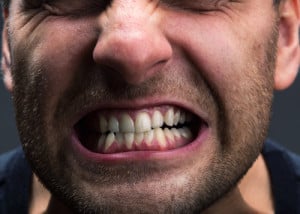 Teeth grinding or clenching – medically referred to as bruxism – can be damaging to your teeth in severe cases. Although many children grind their teeth at one point or another, they typically grow out of it. But, when adults begin grinding their teeth, it’s likely due to an outside factor such as; stress, anxiety, malocclusion (misaligned bite), or even another sleep disorder (like sleep apnea). Sometimes, the habit will dissipate on its own, especially if it’s caused by an emotional factor that has been alleviated. But, since it often occurs throughout the sleep cycle, many patients are unaware of its happening – causing bruxism to become a chronic habit.
Teeth grinding or clenching – medically referred to as bruxism – can be damaging to your teeth in severe cases. Although many children grind their teeth at one point or another, they typically grow out of it. But, when adults begin grinding their teeth, it’s likely due to an outside factor such as; stress, anxiety, malocclusion (misaligned bite), or even another sleep disorder (like sleep apnea). Sometimes, the habit will dissipate on its own, especially if it’s caused by an emotional factor that has been alleviated. But, since it often occurs throughout the sleep cycle, many patients are unaware of its happening – causing bruxism to become a chronic habit.
How To Treat Bruxism
If you’re chronically grinding your teeth at night (whether you know it or not), you may begin to experience uncomfortable symptoms. Things like; tooth sensitivity, chipped, cracked, or even broken teeth, TMJ disorder, soft tissue damage, among many others. More importantly, sleep bruxism is often an indicator that you could be suffering from another sleep disorder – and, if left untreated, could lead to other health complications.
In most cases, your dentist will likely recommend an oral appliance that can keep you from applying this pressure on your teeth. But, there are also other things you can do – like finding different ways to cope emotionally if your bruxism is caused from an emotional factor.
If you notice that you have excess wear on your teeth, it’s time to talk to your dentist – you could be grinding!
